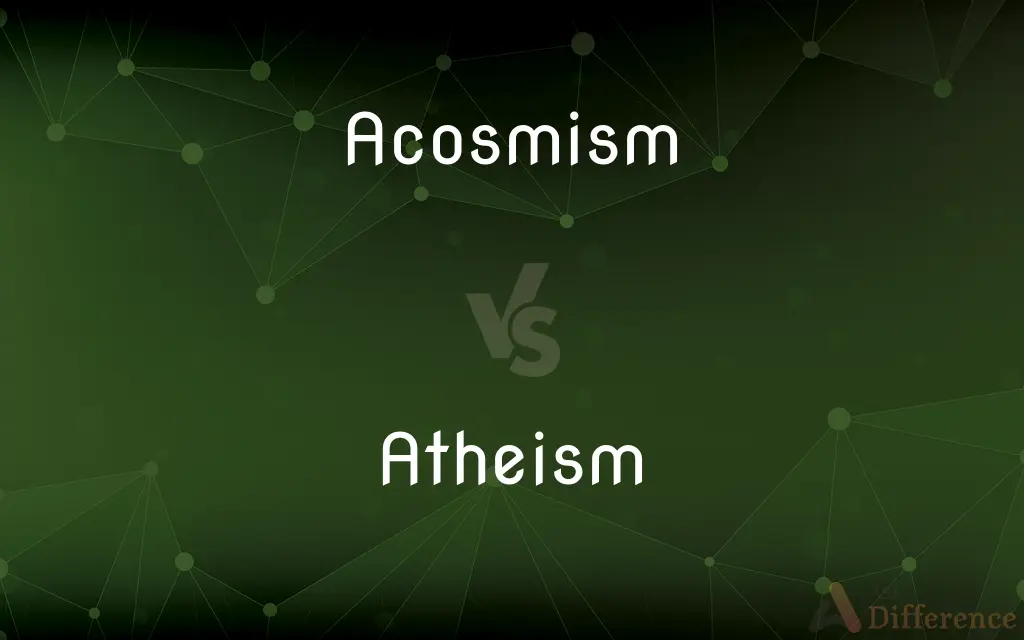Acosmism vs. Atheism — What's the Difference?
By Maham Liaqat & Fiza Rafique — Updated on May 18, 2024
Acosmism denies the reality of the universe, viewing it as an illusion, whereas atheism denies the existence of deities, focusing on a lack of belief in gods.

Difference Between Acosmism and Atheism
Table of Contents
ADVERTISEMENT
Key Differences
Acosmism posits that the universe as we perceive it does not truly exist, often seeing it as an illusion or a manifestation of a higher reality. This concept is prominent in some Eastern philosophies and certain strands of idealism. In contrast, atheism straightforwardly denies the existence of gods or deities, asserting that there is no divine being responsible for the creation or governance of the universe.
Acosmism focuses on the illusory nature of the cosmos, suggesting that the material world is not the ultimate reality. This view often aligns with the belief in a singular, absolute reality that transcends the physical universe. Atheism, on the other hand, centers on the rejection of god(s), without necessarily addressing the nature of the universe itself. Atheists may accept the universe as real but devoid of any divine presence.
Acosmism may be associated with spiritual or philosophical systems that propose the universe is a mental construct or a projection of consciousness. This perspective can be found in Advaita Vedanta, which sees the world as a non-dual reality. Atheism, however, often aligns with scientific and empirical approaches, emphasizing evidence-based beliefs and the absence of supernatural entities.
While acosmism can lead to the belief in an ultimate, unified reality beyond the physical world, atheism simply rejects the notion of gods and does not necessarily imply any specific metaphysical beliefs about the nature of reality. Atheists might be materialists, naturalists, or hold various other worldviews that do not involve deities.
Comparison Chart
Core Belief
Denies the reality of the universe
Denies the existence of deities
ADVERTISEMENT
Philosophical Basis
Often found in Eastern philosophies and idealism
Often associated with scientific and empirical views
View of Universe
Seen as an illusion or mental construct
Accepted as real but without divine beings
Associated Systems
Advaita Vedanta, certain idealist philosophies
Secular humanism, materialism, naturalism
Metaphysical Stance
Proposes a higher, absolute reality
Does not necessarily imply any specific metaphysical belief
Compare with Definitions
Acosmism
Denial of the reality of the universe.
Acosmism posits that our world is merely an illusion.
Atheism
Rejection of religious belief in deities.
Atheism often leads to a focus on humanism and rationalism.
Acosmism
Philosophical belief in the non-reality of the physical world.
Acosmism suggests that what we perceive as real is not truly existent.
Atheism
Position that gods do not exist.
Atheism asserts that there is no divine creator.
Acosmism
View that the cosmos is an illusion of consciousness.
In acosmism, the universe is seen as a projection of the mind.
Atheism
Disbelief in the existence of gods.
Atheism rejects the belief in any divine beings.
Acosmism
Idea that the material world does not constitute true reality.
Followers of acosmism believe in a higher, non-material reality.
Atheism
Doctrine that denies the existence of deities.
Atheism is common in secular and scientific communities.
Acosmism
Concept where the universe is perceived as non-existent.
Acosmism challenges the notion of the physical world's reality.
Atheism
Atheism, in the broadest sense, is an absence of belief in the existence of deities. Less broadly, atheism is a rejection of the belief that any deities exist.
Acosmism
Acosmism, in contrast to pantheism, denies the reality of the universe, seeing it as ultimately illusory (the prefix "ἀ-" in Greek meaning negation; like "un-" in English), and only the infinite unmanifest Absolute as real. Conceptual versions of Acosmism are found in eastern and western philosophies.
Atheism
Disbelief or lack of belief in the existence of God or gods.
Acosmism
A denial of the existence of the universe as distinct from God.
Atheism
Disbelief in or denial of the existence of God or gods.
Acosmism
The determination of the world as mere phenomena to which true reality does not pertain.
Atheism
(narrowly) Belief that no deities exist (sometimes including rejection of other religious beliefs).
Acosmism
A denial of the existence of the universe as distinct from God.
Atheism
(broadly) Rejection of belief that any deities exist (with or without a belief that no deities exist).
Atheism
(very broadly) Absence of belief that any deities exist (including absence of the concept of deities).
Atheism
(historical) Absence of belief in a particular deity, pantheon, or religious doctrine (notwithstanding belief in other deities).
Atheism
The disbelief or denial of the existence of a God, or supreme intelligent Being.
Atheism is a ferocious system, that leaves nothing above us to excite awe, nor around us to awaken tenderness.
Atheism and pantheism are often wrongly confounded.
Atheism
Godlessness.
Atheism
The doctrine or belief that there is no God
Atheism
A lack of belief in the existence of God or gods
Atheism
Lack of belief in gods or supernatural entities.
Many people embrace atheism due to a lack of empirical evidence for gods.
Common Curiosities
What philosophies support acosmism?
Acosmism is supported by certain strands of idealism and Eastern philosophies like Advaita Vedanta.
What is acosmism?
Acosmism is the philosophical belief that the universe is an illusion and does not have true reality.
How does atheism differ from acosmism?
Atheism denies the existence of gods, while acosmism denies the reality of the universe itself.
What kind of worldview does atheism promote?
Atheism often promotes a secular, scientific, and empirical worldview, focusing on evidence-based beliefs.
Does acosmism reject scientific findings?
Not necessarily; acosmism may interpret scientific findings through the lens of an illusory universe.
Are there famous proponents of acosmism?
Yes, philosophers like Georg Wilhelm Friedrich Hegel and spiritual leaders in Advaita Vedanta have supported acosmism.
Can someone be both an acosmism believer and an atheist?
Yes, one can believe the universe is an illusion (acosmism) and also deny the existence of gods (atheism).
What is the main critique of acosmism?
Critics argue that acosmism is speculative and lacks empirical evidence.
Is acosmism a form of atheism?
No, acosmism deals with the nature of the universe, whereas atheism deals specifically with the belief in gods.
What is the main critique of atheism?
Critics argue that atheism can be overly dismissive of religious and spiritual experiences.
Can acosmism and atheism coexist within the same philosophical system?
Yes, they can coexist if a system denies both the reality of the universe and the existence of gods.
How does atheism view the universe?
Atheism generally accepts the universe as real but without divine beings or supernatural elements.
Does acosmism involve any spiritual practices?
Often, yes, acosmism can be associated with meditation and spiritual practices aiming to perceive the higher reality.
Are there famous atheists?
Yes, notable atheists include Richard Dawkins, Christopher Hitchens, and Sam Harris.
Does atheism involve spirituality?
Generally, atheism does not involve spirituality but focuses on rational and empirical perspectives.
Share Your Discovery

Previous Comparison
Bully vs. Thug
Next Comparison
Entice vs. EntiseAuthor Spotlight
Written by
Maham LiaqatCo-written by
Fiza RafiqueFiza Rafique is a skilled content writer at AskDifference.com, where she meticulously refines and enhances written pieces. Drawing from her vast editorial expertise, Fiza ensures clarity, accuracy, and precision in every article. Passionate about language, she continually seeks to elevate the quality of content for readers worldwide.
















































